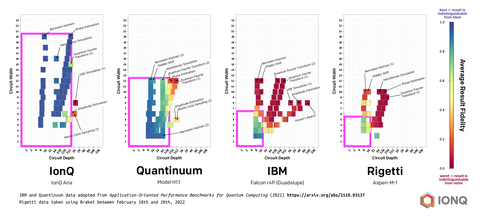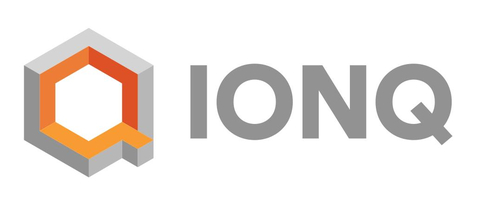COLLEGE PARK, Md.--(BUSINESS WIRE)--Today, IonQ (NYSE: IONQ) announced that IonQ Aria, the Company’s latest quantum computer, has achieved a record 20 algorithmic qubits and has furthered its lead as the most powerful quantum computer in the industry based on standard application-oriented industry benchmarks. IonQ Aria, currently available for customers in private beta, has the potential to improve performance even further over the coming months.
In 2020, IonQ proposed algorithmic qubits (#AQ) as an application-oriented metric to assist the industry in evaluating quantum computers’ utility in real-world settings. Today, IonQ published a detailed blog post to further define and add rigor to the #AQ metric, as well as to explain the benchmarking results from IonQ Aria relative to its industry peers. Using a series of algorithmic benchmarks first pioneered by the Quantum Economic Development Consortium (QED-C) to evaluate the number of algorithmically-relevant quantum bits (qubits) in a system, #AQ focuses on the practical application of quantum computers, as compared to other metrics that are less relevant to customers and might suggest capabilities that do not materialize in practice.
The benchmarking results show that IonQ’s trapped ion qubits coupled with IonQ’s Quantum OS are more accurate than those used in competitors’ quantum computers. As seen in the chart above, IonQ Aria is able to successfully execute quantum circuits containing more than 550 gates, as compared to the superconducting systems that can only execute circuits containing dozens. This enables IonQ to greatly exceed peers in practical uses of quantum algorithms.
“Having an #AQ of 20 means one can execute a reference quantum circuit over 20 qubits that contain over 400 entangling gate operations and expect the results to be correct with meaningful confidence,” said Jungsang Kim, co-founder and Chief Technology Officer. “Using IonQ Aria, we have executed a half dozen different quantum algorithms that were identified by QED-C to be of practical interest to the quantum industry. We are extremely excited to share the news about the level of quantum computation that can be successfully executed on IonQ Aria, which far exceeds anything publicly available in the market today.”
“We’ve always said that IonQ is going to be as much a software company as a hardware company in the future. We've put this into practice by optimally reconfiguring our hardware for a spectrum of algorithms and running the same algorithm in different ways to mitigate errors, all through automated software.” said co-founder and Chief Scientist Christopher Monroe.
IonQ intends to submit the benchmarking data and the techniques behind them to a peer-reviewed journal in the coming months. IonQ also plans to discuss #AQ at upcoming conferences, such as Quantum Information Processing (QIP) to be held in March 2022.
An earlier instance of IonQ Aria was demonstrated to be the most powerful quantum computer on the market in an independent industry-wide benchmarking study performed in summer 2021. Since then, it has already outperformed its past achievements with more growth potential in store. IonQ Aria is currently used in commercial applications, such as IonQ’s partnerships with customers in automotive to explore more efficient battery chemistry and financial services to understand correlations in the stock market, and access will be rolled out to more customers in the coming months.
About IonQ
IonQ, Inc. is a leader in quantum computing, with a proven track record of innovation and deployment. IonQ’s latest generation quantum computer, IonQ Aria, is the world’s most powerful quantum computer, and IonQ has defined what it believes is the best path forward to scale.
IonQ is the only company with its quantum systems available through the cloud on Amazon Braket, Microsoft Azure, and Google Cloud, as well as through direct API access. IonQ was founded in 2015 by Christopher Monroe and Jungsang Kim based on 25 years of pioneering research. To learn more, visit www.ionq.com.
IonQ Forward-Looking Statements
This press release contains certain forward-looking statements within the meaning of Section 27A of the Securities Act of 1933, as amended, and Section 21E of the Securities Exchange Act of 1934, as amended. Some of the forward-looking statements can be identified by the use of forward-looking words. Statements that are not historical in nature, including the words “anticipate,” “expect,” “suggests,” “plan,” “believe,” “intend,” “estimates,” “targets,” “projects,” “should,” “could,” “would,” “may,” “will,” “forecast” and other similar expressions are intended to identify forward-looking statements. These statements include those related to IonQ Aria’s technical achievements, future potential, and status in the quantum computing industry; the use and acceptance of #AQ as an evaluation tool; IonQ’s ability to further develop and advance its quantum computers and achieve scale; IonQ’s market opportunity and anticipated growth; and the commercial benefits to customers of using quantum computing solutions. Forward-looking statements are predictions, projections and other statements about future events that are based on current expectations and assumptions and, as a result, are subject to risks and uncertainties. Many factors could cause actual future events to differ materially from the forward-looking statements in this press release, including but not limited to: market adoption of quantum computing solutions and IonQ’s products, services and solutions; the ability of IonQ to protect its intellectual property; changes in the competitive industries in which IonQ operates; changes in laws and regulations affecting IonQ’s business; IonQ’s ability to implement its business plans, forecasts and other expectations, and identify and realize additional partnerships and opportunities; and the risk of downturns in the market and the technology industry including, but not limited to, as a result of the COVID-19 pandemic. The foregoing list of factors is not exhaustive. You should carefully consider the foregoing factors and the other risks and uncertainties described in the “Risk Factors” section of IonQ’s Quarterly Report on Form 10-Q for the quarter ended September 30, 2021 and other documents filed by IonQ from time to time with the Securities and Exchange Commission. These filings identify and address other important risks and uncertainties that could cause actual events and results to differ materially from those contained in the forward-looking statements. Forward-looking statements speak only as of the date they are made. Readers are cautioned not to put undue reliance on forward-looking statements, and IonQ assumes no obligation and does not intend to update or revise these forward-looking statements, whether as a result of new information, future events, or otherwise. IonQ does not give any assurance that it will achieve its expectations.




